Earlier this week, the online collection Comics with Problems released the ironically titled "Dignity and Respect: A Training Guide on Homosexual Conduct Policy." The colorful, wordy comic from 2001 was published by the Army to educate soldiers about "Don't Ask, Don't Tell," and how it is enforced and carried out. On the inside cover, in big, bold letters, is written:
Our mission is to comply with the law that prohibits homosexual conduct while at the same time respecting the privacy and dignity of every soldier.
The roughly 14,000 men and women who have been forced to give up their military careers because of this discriminatory and counterproductive policy know firsthand that such a "mission" is impossible. It is not possible to treat every soldier with "dignity" while also treating certain soldiers as second-class service members simply because of who they are. It is not possible to respect the privacy of every soldier when investigations can be started to explore who certain soldiers choose to enter into intimate relationships with. In that sense, the comic was setting itself up for failure from the first page.
What follows over the next roughly 30 pages is a contorted, bizarre attempt to show how irrational discrimination can be enforced in a seamless and cheerful manner. In one early scene, a commander informs a solider that he is going to recommend the initiation of "separation action" against him because of his "homosexual conduct." No, you are a not reading a George Orwell novel. This is actual, current government policy!
Providing further helpful commentary on the Army comic was Rachel Maddow, who, on Wednesday's show, provided voice-over readings from certain scenes.
While the Army takes more than 30 pages to try to explain and defend the irrational and indefensible, the ACLU, with the help of Matt Bors, has a very simple, straight-forward illustration of the cruel reality of "Don't Ask, Don't Tell."

And to think we didn't even get to use the phrase "separation action"!


